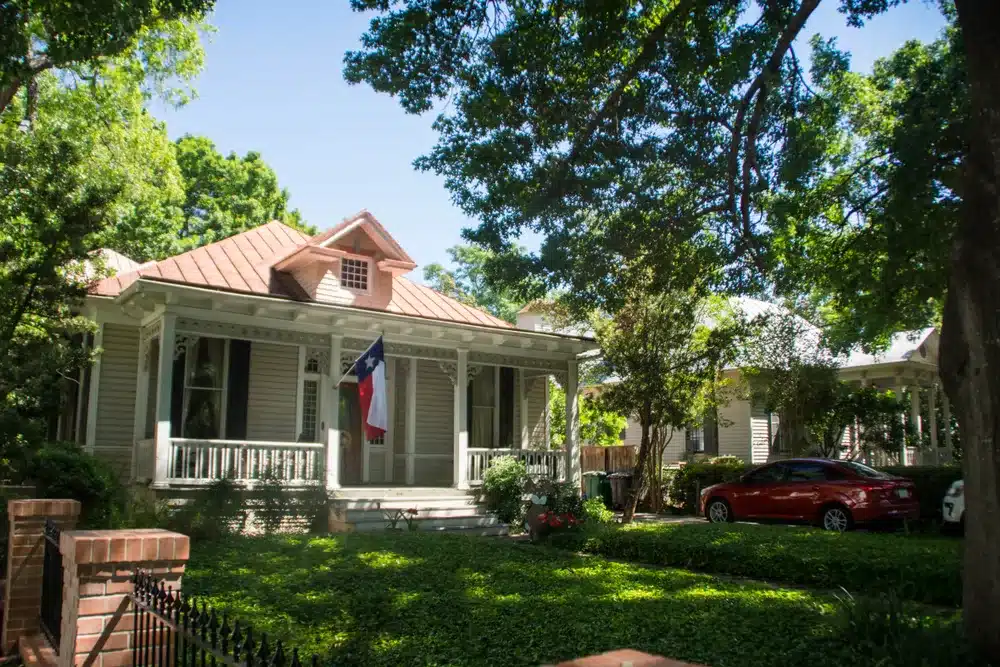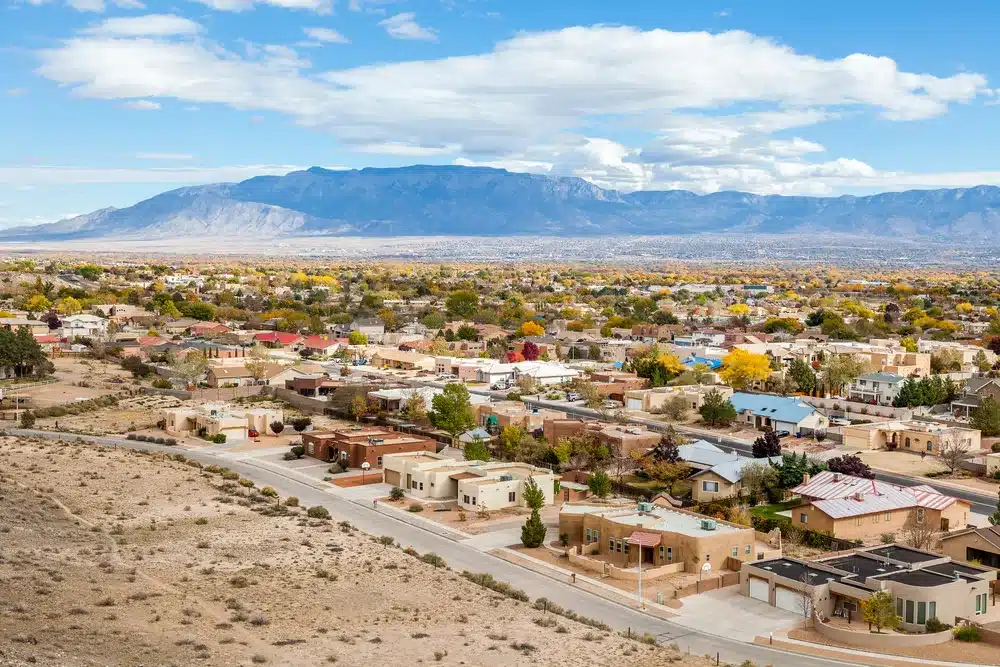
Also called Queen City, Charlotte is equal parts Southern charm and urban playground, and a healthy helping of growth.
From the towering Bank of America to the Charlotte Motor Speedway (or America’s Home for Racing), the city’s most iconic symbols don’t exactly mince words — skyscrapers and NASCAR go hand in glove at the annual Bank of America Roval 400.
Aside from that, Charlotte has built a reputation year after year as being one of the best places to live in the U.S. It was also named a 2023 All-America City. So, if you think that Charlotte’s showing off a bit, it’s definitely earned the right.
Want variety? Charlotte’s got it. You can be sipping craft beer in NoDa one day and soaking up the rich history of the city the next in Dilworth. And if you ever need a break from the concrete jungle, you’re just a couple of hours away from both the Appalachian Mountains and the Atlantic Ocean.
The residents of Charlotte — or Charlotteans, if you want to be fancy — know a good thing when they see it, and they’ve got so much going on that they don’t really feel the urge to leave it. From the music of local street performers to the roar of Panthers fans on game day, there’s a rhythm here that makes you want to tap your feet and just hang out for a while.
Now, whether you’re here for work, school or just a fresh start, Charlotte and us over at Storage. com are ready to show you what it’s all about.
Cost of Living in Charlotte
If you’re considering making Charlotte your new home, it’s good to know what your wallet might be in for. Compared to most major U.S. cities, the cost of living here strikes a pretty good balance, so you can easily enjoy your life without constantly checking your bank account.
What is the cost of living in Charlotte, NC, for a single person?
For an average 900 sq. ft. apartment, you’re looking at about $185 per month for electricity, heating, cooling, water and garbage. And expect to spend around $300 to $400 a month per person on groceries.
- New home (median value): $400,000
- Rent (1-bedroom apartment): starting at $1,400/month outside of the city center
- Utilities: starting at $100/month
- Internet: $75/month on average
- Mobile phone: starting at $40/month
- Groceries: $300–$400/month
- Restaurant meal: $15–$30 at an inexpensive place; double at a mid-range restaurant
- Gym membership: $55/month on average
Housing and Real Estate

Hot but not too hot, the real estate in Charlotte sees an average selling time of just over a month, speaking to the city’s popularity and continued demand. Eyeing a sleek Uptown condo or a cozy bungalow in the ‘burbs? Either way, new homes in Charlotte are within reach. That’s because the median home value is around $400,000 — about 11% above the national average but still very reasonable for a city as populous as Charlotte.
If renting is more your speed, expect to pay about $1,650 a month for an apartment. That is virtually a steal compared to New York or San Francisco, for instance. And apartments range from modern high-rises to cozy garden-style communities, many built in the last two decades.
Popular Neighborhoods
Charlotte, NC, is one of those cities that are fond of their heritage yet embrace change. Some neighborhoods in the Charlotte area wear their historical badge with pride — a peek into the way things used to be — while others hum with the excitement of new development and a modern pace.
Do you dream of rubbing shoulders with Allen Iverson? Consider moving to Ballantyne, an affluent Charlotte area just south of I-485. But if that’s outside your budget, these top neighborhoods are highly-rated places to live in Charlotte:
South End
What was once a totally industrial pocket chock-full of factories and warehouses has turned a complete about-face. Today, it counts as one of the most walkable neighborhoods in Charlotte and is filled with sleek, modern apartments for young professionals, numerous boutiques and an ever-booming brewery scene. The Rail Trail is a popular pathway that winds through the heart of South End, basically filled with on-trend cafes and public art to make casual walks and biking a dream.
NoDa
NoDa, short for North Davidson, is the artsy section of Charlotte. This old mill village has become a hotbed of creativity. From art galleries to live music venues to a slew of restaurants serving up everything from Southern comfort food to ethnic eats, the neighborhood hums. Every wall in NoDa tells a story through artistic expression in colorful murals that celebrate its creative energy.
Dilworth
Dilworth is a neighborhood that skillfully balances history and a sense of community. As the first streetcar suburb of Charlotte, it is known for its historic bungalows and towering oak trees. It is quiet, residential and carries the feel of a small town even though it’s just minutes away from the city center.
Employment and Job Market
Yes, Charlotte is known for banking — it’s Bank of America’s home, and Wells Fargo is huge here — but there’s more to it:
- Advanced manufacturing employs more than 146,000 individuals and is on the rise. Since 2023, more than 4,400 new jobs have been announced throughout the region, most of them at Eli Lily, E&J Gallo Winery, Pallidus and Albemarle.
- Large names reign in the circle of healthcare, which includes Atrium Health and Novant Health; these powerhouses provide thousands of jobs in their hospitals, clinics and labs.
- There are close to 45,000 professionals shaping the future in Charlotte’s blossoming tech and innovation sector.
- With great infrastructure and location, Charlotte is a key hub for moving goods efficiently — that’s logistics and distribution.
Wage-wise, you should know that business, financial operations and sales roles in the Charlotte area offer mean hourly wages about 5% higher than the national average. At the opposite end of the spectrum, education roles, like teaching and library positions, offer wages approximately 21% lower than the national average.
Are you a recent college grad or have one in your family looking to move over? Well, you may want to know that Charlotte ranks as the fifth-best city in the U.S. for recent college graduates to find a job; hence, it is very attractive to young professionals.
- Charlotte, NC, per capita income: $47,500 — 26% higher than the state average and 15% above the national average.
- Charlotte, NC, median household income: $74,000, slightly below the national average but 12% higher than the state average.
- Unemployment rate in the Charlotte area: 4.2% (as of July 2024), below the national 4.5%.
Education and Schools
Charlotte takes education seriously, offering plenty of options for families and students at every stage. In fact, Charlotteans are quite well-educated — almost 90 percent of them have a high school diploma, and over 45 percent hold a bachelor’s degree or higher.
- You have 184 public schools to choose from in Charlotte, as the Charlotte-Mecklenburg School District is the biggest in North Carolina. While it’s true that the high school graduation rate is slightly below the state average, schools here are doing everything they can to ensure that each and every student reaches their full potential.
- If you’re looking for something different, Charlotte has 85 private schools, many with religious ties, offering an alternative learning experience. Of these, one of the most popular is Providence Day School, whose claim to fame is the quality of the academic environment and the high SAT scores.
- There are some very good colleges and universities around, too, like Central Piedmont Community College and Queens University of Charlotte, but the true star is the University of North Carolina at Charlotte, with over 30,000 students studying everything from business to engineering.
Recreation and Outdoor Activities

With natural beauty surrounding the city, it’s fairly easy to get out and take advantage of it. From hiking trails in nearby parks to biking paths snaking through the city, Charlotte is one of the best cities for outdoor recreation access. Charlotte is surrounded by an abundance of lakes and waterways, perfect for motor-boating and kayaking.
If you’re really up for an adventure, head to the U.S. National Whitewater Center. It covers 1,300 acres and houses the world’s largest engineered whitewater river. You can try whitewater rafting, mountain biking, hiking, rock climbing and even yoga here. This is one proper day-long destination full of activities meant for all ages and skill levels.
Cultural Attractions and Festivals

Rich in culture and fun events, Charlotte has it all, starting with the NASCAR Hall of Fame. It is so good that even the non-racing fan would get to like something about the place, with its interactive exhibits and thrilling simulations.
- Want a different take on museums? Mint Museum is your new world of art, from contemporary to classical. For the inquisitive minds of all ages, there is Discovery Place Science.
- More of an outdoorsy person? Just a short drive north, come face-to-face with birds of prey at the Carolina Raptor Center and leave knowing a little more about conservation.
- How about sports? For an exciting game day, you can catch the Carolina Panthers at Bank of America Stadium or the Charlotte Hornets at Spectrum Center.
- And if festivals course through your veins, don’t miss the nearby Carolina Renaissance Festival in Huntersville, ranking among one of the largest themed festivals in the country, replete with jousting, music and good ol’ 16th-century fun.
Transportation and Commute

Getting around Charlotte is a mix of driving, public transit and sometimes a little patience. While the city doesn’t excel at public transport — Walkscore.com gives it only a score of 27, ouch! — the Charlotte Area Transit System (CATS) does provide some very reliable options, including the LYNX Blue Line light rail that stretches 19 miles in length, connecting many key parts of the city.
If you’re new to the area, know that you can expect an average commute time of about 25 minutes, but rush hour traffic can be slower than that, worst on Tuesdays from 5 to 6 PM.
Pro Tip: To ease the commute, consider CATS’ vanpool program, a cost-effective option for groups of 4 to 15 people.
Self-Storage Solutions in Charlotte
Moving to Charlotte or just need some extra space? Whether you’re packing up to settle into a new place, downsizing or just have too many things to fit in your new Charlotte digs, storage units make life so much easier.
The best part? Charlotte has plenty of options, so you can find a storage unit that’s just right for you.
- Got delicate items that can’t handle the Southern heat? No problem — there are climate-controlled units that keep your stuff cool and safe.
- Need storage in Charlotte that you can pop in and out of quickly? Drive-up access means you can load and unload in a snap.
Plus, with Charlotte growing fast, having a little extra space can mean a whole lot more — from stashing away all the things you don’t need every day, like holiday decorations, to bulky sports gear aka your bike or your kayak for trips to Lake Norman.
Want to check out another city in North Carolina? Check out our guide on living in Greensboro.

![Relocating RVs: An Expert Guide to Finding RV Relocation Deals and Cheap Motorhomes for Rent [2025]](https://blog.storage.com/wp-content/uploads/2025/03/rv-relo.jpg)



